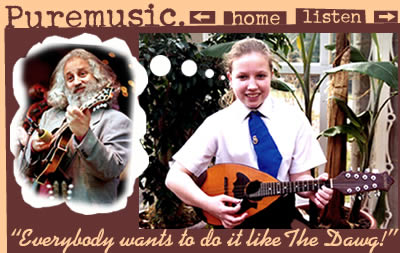
A Conversation with David Grisman (continued)
DG: But I thought it was a good idea. And one day he called me and said, "I want to get together." It was just going to be the two of us. So I asked this friend of mine to run out to a music store and find a book of children's songs. And he came back with a huge book, with, like, 5,000 songs. Then it was "Oh, wow. Why don't we try this? Why don't we try that?" They were, you know, "Freight Train" and "A Horse Named Bill."
PM: Yeah, good songs.
DG: And "Jenny Jenkins." A few things like that. "Oh, yeah, I remember that." And we just did them, and they went down real easy, because that's one thing about kids' songs: they're easy.
PM: Yeah. And it's pretty amazing -- I mean, sure, a number of our friends might sit down and play "Freight Train," but it's not everybody that knows "Jenny Jenkins."
DG: But we both knew that song. I had a record of a guy named Frank Luther doing that song, who made records when we were kids. I mean, Jerry and I had similar childhoods.
PM: Right, on opposite coasts.
DG: Yeah. We both had fathers that were musicians who died when we were young.
PM: Oh! Where in Jersey did you grow up?
DG: Well, I was born in Hackensack. I only was born there, I never lived there. I mostly lived in Bergenfield, until I was 10, and then I moved to Passaic and I lived there. My father owned Tenafly Paint and Hardware.
PM: Get out of here! I lived in Oakland a bunch of years, just a few towns away from you.
DG: Oh, yeah? I was just back there. I just played a gig in Englewood.
PM: Really?
DG: Yeah.
PM: Yeah, my music background is very similar, too. All those songs on the Shady Grove record, it was like, wow, all these tunes that we played growing up. That was a wonderful record. I loved that.
DG: Oh, thank you.
PM: I have a question about the so-called Pizza Tapes. Did that having anything to do with what used to be called Brother's Pizza on the Miracle Mile? The owner was a friend of ours, and I know that Jerry used to get a lot of pizza from him, he was an East Coast guy.
DG: I don't know. See, that's just one story I heard. I wasn't there, and Jerry and I never really talked about it. I also heard that he gave the tape to a scuba diving instructor in Hawaii. But, you know, this just lent itself to some more clever marketing. You wouldn't want to call it The Scuba Tapes.
PM: [laughs]
DG: Well, you know, maybe. Some people were trading the tape as Pizza Boy, it was being called that by some people.
For three years, I was just pissed about that tape. People would come up with this tape, and I would get mad. And then Rob Bleetstein went to work for us, and he said, "Man, you need to put that out. It's all over the place." And I said, "Well, people got it already, you know?" But he said, "Yeah, but it sounds so bad, with all these degenerated copies." And finally I said, "All right." And it's actually sonically one of the best recordings. And in the end all that bootlegging and having it out actually helped. I mean, it just took off as soon as we put it out, because people wanted it. Everybody that had it wanted the good version of it.
PM: That's funny.
DG: And I made sure there were some things in there that weren't on the bootlegs. There were three songs that ran off the master reel, but there were backup digital tapes made. And so I was able to reconstruct three tunes. What got out was longer than what I put out, because there were some multiple takes on there. And I was thinking at one point of putting the whole thing out, that's the only way to have it be more than what people already have. But then I decided, nah, that's too much. It's going to have to be two CDs.
PM: Right. Just make it sound good.
DG: And just make one really good record.
PM: Yeah. continue
print PDF listen to clips puremusic home